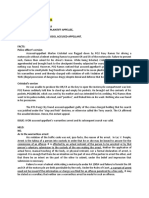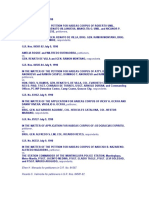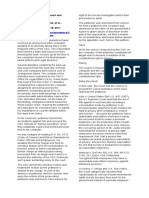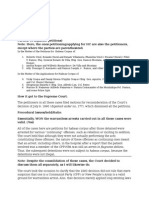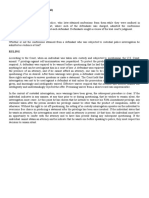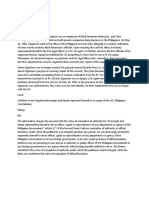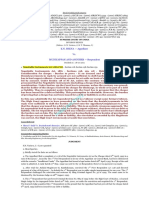495 UMIL vs. RAMOS (1990)
495 UMIL vs. RAMOS (1990)
Uploaded by
JERICHO JUNGCOCopyright:
Available Formats
495 UMIL vs. RAMOS (1990)
495 UMIL vs. RAMOS (1990)
Uploaded by
JERICHO JUNGCOOriginal Description:
Copyright
Available Formats
Share this document
Did you find this document useful?
Is this content inappropriate?
Copyright:
Available Formats
495 UMIL vs. RAMOS (1990)
495 UMIL vs. RAMOS (1990)
Uploaded by
JERICHO JUNGCOCopyright:
Available Formats
495 UMIL vs.
RAMOS (1990)
There are eight (8) petitioners for habeas corpus filed before the Court, which have been consolidated because of the similarity of
issues raised, praying for the issuance of the writ of habeas corpus, ordering the respective respondents to produce the bodies of the
persons named therein and to explain why they should not be set at liberty without further delay. In their respective Returns, the
respondents uniformly assert that the privilege of the writ of habeas corpus is not available to the petitioners as they have been legally
arrested and are detained by virtue of valid informations filed in court against them. The petitioners counter that their detention is
unlawful as their arrests were made without warrant and, that no preliminary investigation was first conducted, so that the
informations filed against them are null and void.
The Court has carefully reviewed the contentions of the parties in their respective pleadings, and it finds that the persons detained have
not been illegally arrested nor arbitrarily deprived of their constitutional right to liberty, and that the circumstances attending these
cases do not warrant their release on habeas corpus.
RULING
1. In G.R. No. 81567, as to Rolando Dural, it clearly appears that he was not arrested while in the act of shooting the two (2)
CAPCOM soldiers aforementioned. Nor was he arrested just after the commission of the said offense for his arrest came a day
after the said shooting incident. Seemingly, his arrest without warrant is unjustified. However, Rolando Dural was arrested for
being a member of the New People’s Army (NPA), an outlawed subversive organization. Subversion being a continuing offense,
the arrest of Rolando Dural without warrant is justified as it can be said that he was committing an offense when arrested. The
crimes of rebellion, subversion, conspiracy or proposal to commit such crimes, and crimes or offenses committed in furtherance
thereof or in connection therewith constitute direct assaults against the State and are in the nature of continuing crimes.
2. In G.R. Nos. 84581-82, as to the arrest of Amelia Roque and Wilfredo Buenaobra, without warrant, is also justified. When
apprehended at the house of Renato Constantino in Marikina Heights, Marikina, Metro Manila, Wilfredo Buenaobra admitted that
he was an NPA courier and he had with him letters to Renato Constantino and other members of the rebel group. Amelia Roque,
upon the other hand, was a member of the National United Front Commission, in charge of finance, and admitted ownership of
subversive documents found in the house of her sister in Caloocan City. She was also in possession of ammunition and a
fragmentation grenade for which she had no permit or authority to possess.
3. In G.R. Nos. 84583-84, the arrest of Domingo Anonuevo and Ramon Casiple, without warrant, is also justified under the rules.
Both are admittedly members of the standing committee of the NUFC and, when apprehended in the house of Renato Constatino,
they had a bag containing subversive materials, and both carried firearms and ammunition for which they had no license to possess
or carry.
4. In G.R. No. 83162, the arrest without warrant, of Vicky Ocaya is justified under the Rules, since she had with her unlicensed
ammunition when she was arrested. Vicky Ocaya arrived in a car driven by Danny Rivera. Subversive documents and several
rounds of ammunition for a .45 cal. pistol were found in the car of Vicky Ocaya after a lawful search.
5. In. G.R. No. 85727 (Espiritu vs. Lim), accused Espiritu was the General Secretary of the Pinagkaisahang Samahan ng Tsuper at
Operators Nationwide (PISTON), an association of drivers and operators of public service vehicles in the Philippines, organized
for their mutual aid and protection. He was also lawfully arrested without a judicial warrant of arrest since petitioner when arrested
had in fact just committed an offense in that in the afternoon of 22 November 1988, during a press conference at the National Press
Club where he was heard to say “Bukas tuloy ang welga natin, sumagot na ang Cebu at Bicol na kasali sila, at hindi tayo titigil
hanggang hindi binibigay ng gobyerno ni Cory ang gusto nating pagbaba ng halaga ng spare parts, bilihin at and pagpapalaya sa
ating pinuno na si Ka Roda hanggang sa magkagulo na.” His detention is justified in view of the Information filed against him
before the Regional Trial Court of Manila, docketed therein as Criminal Case No. 88-683-85, charging him with violation of Art.
142 of the Revised Penal Code (Inciting to Sedition).
6. In G.R. No. 86332 (Nazareno vs. Station Commander), we also find no merit in the submission of Narciso Nazareno that he was
illegally arrested and is unlawfully detained. The record of this case shows that at about 8:30 o'clock in the morning of 14
December 1988, one Romulo Bunye II was killed by a group of men near the corner of T. Molina and Mendiola Streets in
Alabang, Muntinglupa, Metro Manila. One of the suspects in the killing was Ramil Regal who was arrested by the police on 28
December 1988. Upon questioning, Regal pointed to Narciso Nazareno as one of his companions in the killing of the said Romulo
Bunye II. In view thereof, the police officers, without warrant, picked up Narciso Nazareno and brought him to the police
headquarters for questioning. Obviously, the evidence of petitioner's guilt is strong because on 3 January 1989, an information
charging Narciso Nazareno, Ramil Regala, and two (2) others, with the killing of Romulo Bunye II was filed with the Regional
Trial Court of Makati, Metro Manila. The case is docketed therein as Criminal Case No. 731.
At this point, we refer to petitioner's plea for the Court of re-examine and, thereafter, abandon its pronouncement in Ilagan
vs. Enrile, that a writ of habeas corpus is no longer available after an information is filed against the person detained and a warrant of
arrest or an order of commitment, is issued by the court where said information has been filed. The petitioners claim that the said
ruling, which was handed down during the past dictatorial regime to enforce and strengthen said regime, has no place under the
present democratic dispensation and collides with the basic, fundamental, and constitutional rights of the people.
We find, however, no compelling reason to abandon the said doctrine. It is based upon express provision of the Rules of Court and the
exigencies served by the law. The fears expressed by the petitioners are not really unremediable. As the Court sees it, re-examination
or reappraisal, with a view to its abandonment, of the Ilagan case doctrine is not the answer. The answer and the better practice would
be as the Court itself states in Morales, Jr. vs. Enrile, "in all petitions for habeas corpus the court must inquire into every phase and
aspect of petitioner's detention-from the moment petition was taken into custody up to the moment the court passes upon the merits of
the petition;" and "only after such a scrutiny can the court satisfy itself that the due process clause of our Constitution has in fact been
satisfied." This is exactly what the Court has done in the petitions at bar. This is what should henceforth be done in all future cases
of habeas corpus. In Short, all cases involving deprivation of individual liberty should be promptly brought to the courts for their
immediate scrutiny and disposition.
WHEREFORE, the petitions are hereby DISMISSED, except that in G.R. No. 85727 (Espiritu vs. Lim), the bail bond for petitioner's
provisional liberty is hereby ordered reduced from P60,000.00 to P10,000.00. No costs.
You might also like
- Case Digest - Rule 113 2019Document16 pagesCase Digest - Rule 113 2019Lorie Jean Udarbe100% (2)
- People v. Estrada - People v. UlamaDocument2 pagesPeople v. Estrada - People v. Ulamaanna bee100% (1)
- Petition For Bail PatayanDocument9 pagesPetition For Bail PatayanShiNo ratings yet
- Jose Luis Ramirez, A075 986 662 (BIA May 31, 2013)Document1 pageJose Luis Ramirez, A075 986 662 (BIA May 31, 2013)Immigrant & Refugee Appellate Center, LLCNo ratings yet
- 67 Umil vs. Ramos 187 SCRA 311 SEPTEMBER 13, 2018Document20 pages67 Umil vs. Ramos 187 SCRA 311 SEPTEMBER 13, 2018Reth GuevarraNo ratings yet
- Consti P. 9, 13, 17Document86 pagesConsti P. 9, 13, 17Rcl ClaireNo ratings yet
- Umil v. RamosDocument24 pagesUmil v. RamosMarleneNo ratings yet
- Umil Vs Ramos, 187 SCRA 311Document29 pagesUmil Vs Ramos, 187 SCRA 311AddAllNo ratings yet
- Umil v. Ramos, SupraDocument11 pagesUmil v. Ramos, SupraPRINCESS MAGPATOCNo ratings yet
- 19900709-Gr81567-Umil Vs RamosDocument13 pages19900709-Gr81567-Umil Vs RamosnikkaremullaNo ratings yet
- Case Digest Criminal Law II Group IVDocument6 pagesCase Digest Criminal Law II Group IVMaria Danice Angela100% (1)
- Vs. ROSA ARUTA y MENGUIN, Accused-AppellantDocument15 pagesVs. ROSA ARUTA y MENGUIN, Accused-AppellantJof BotorNo ratings yet
- People Vs Aruta (Search and Arrest)Document22 pagesPeople Vs Aruta (Search and Arrest)Larry Fritz SignabonNo ratings yet
- Topic: Equipoise Rule Eugenio vs. People G.R. No. 168163, March 26, 2008 Ponente: Carpio, J. FactsDocument11 pagesTopic: Equipoise Rule Eugenio vs. People G.R. No. 168163, March 26, 2008 Ponente: Carpio, J. FactsEm Asiddao-DeonaNo ratings yet
- Consti2 9th CompilationDocument38 pagesConsti2 9th CompilationElla QuiNo ratings yet
- Republic of The Philippines Manila en BancDocument22 pagesRepublic of The Philippines Manila en BancChielsea CruzNo ratings yet
- Consti Case Digest For Search and SeizuresDocument9 pagesConsti Case Digest For Search and SeizuresDrizza FerrerNo ratings yet
- People vs. BelocuraDocument4 pagesPeople vs. BelocuraBint MananNo ratings yet
- Cases For Constitutional Law 2 Feb 12Document10 pagesCases For Constitutional Law 2 Feb 12Sarah BasinangNo ratings yet
- Third Division, Romero (J) : 3 ConcurDocument8 pagesThird Division, Romero (J) : 3 ConcurtinallenaNo ratings yet
- CrimPro Rule 112 Rule 117 Compiled Case DigestsDocument22 pagesCrimPro Rule 112 Rule 117 Compiled Case DigestsRafael AbedesNo ratings yet
- PP Vs Aruta, 288 Scra 626 G.R. No. 120915 April 3, 1998Document13 pagesPP Vs Aruta, 288 Scra 626 G.R. No. 120915 April 3, 1998Ronald Alasa-as AtigNo ratings yet
- Right of Suspects 19-20Document3 pagesRight of Suspects 19-20Jimcris Posadas Hermosado100% (1)
- Umil v. Ramos PDFDocument3 pagesUmil v. Ramos PDFKJPL_1987No ratings yet
- People v. ArutaDocument12 pagesPeople v. ArutaTrixie MarianoNo ratings yet
- Criminal Law People V DiosoDocument4 pagesCriminal Law People V DiosoMigIwaczNo ratings yet
- People of The Philippines, Plaintiff-Appellee vs. Olive Rubio Mamaril, Accused-AppellantDocument6 pagesPeople of The Philippines, Plaintiff-Appellee vs. Olive Rubio Mamaril, Accused-AppellantLester BalagotNo ratings yet
- Crim 2Document21 pagesCrim 2IJ SaavedraNo ratings yet
- Consti2 10th CompilationDocument24 pagesConsti2 10th CompilationRollyn Dee De Marco PiocosNo ratings yet
- Pp. vs. Aruta PDFDocument9 pagesPp. vs. Aruta PDFJerome MoradaNo ratings yet
- People vs. ArutaDocument17 pagesPeople vs. ArutaGeanelleRicanorEsperonNo ratings yet
- LIM V. CA Case DigestDocument79 pagesLIM V. CA Case DigestWarren Codoy ApellidoNo ratings yet
- Nolasco v. PanoDocument2 pagesNolasco v. PanoPaolo BañaderaNo ratings yet
- People v. TuazonDocument7 pagesPeople v. TuazonIan TaduranNo ratings yet
- Assigned Case Digest For Consti 2 3Document3 pagesAssigned Case Digest For Consti 2 3MariaAyraCelinaBatacanNo ratings yet
- CDDA Case DigestsDocument15 pagesCDDA Case DigestsReino CabitacNo ratings yet
- Dela Cruz vs. People G.R. No. 200748, July 23, 2014 Facts: Petitioner Jaime D. Dela Cruz Was Charged With Violation of Section 15, Article II ofDocument20 pagesDela Cruz vs. People G.R. No. 200748, July 23, 2014 Facts: Petitioner Jaime D. Dela Cruz Was Charged With Violation of Section 15, Article II ofredlacsonNo ratings yet
- Villanueva Vs PeopleDocument14 pagesVillanueva Vs PeopleMarianne Hope VillasNo ratings yet
- People of The Philippines, Plaintiff-Appellee, Vs - Medario Calantiao Y DIMALANTA, Accused-AppellantDocument9 pagesPeople of The Philippines, Plaintiff-Appellee, Vs - Medario Calantiao Y DIMALANTA, Accused-AppellantAaron CariñoNo ratings yet
- Umil V Ramos (1991)Document6 pagesUmil V Ramos (1991)Gabe RuaroNo ratings yet
- People v. NazarenoDocument8 pagesPeople v. Nazarenorvci2016No ratings yet
- Check PointDocument31 pagesCheck PointDennis TolentinoNo ratings yet
- Corpus Is Not Available To The Petitioners As They Have Been Legally Arrested and Are Detained by VirtueDocument8 pagesCorpus Is Not Available To The Petitioners As They Have Been Legally Arrested and Are Detained by Virtuelicarl benitoNo ratings yet
- Umil V Ramos 1Document4 pagesUmil V Ramos 1Chino SisonNo ratings yet
- People Vs de Gracia To Waterhouse Drug CorpDocument3 pagesPeople Vs de Gracia To Waterhouse Drug CorpThrees SeeNo ratings yet
- In Re Umil v. RamosDocument18 pagesIn Re Umil v. RamosAlexis Dominic San ValentinNo ratings yet
- Alih Vs Castro GL. 69401 This Case Was in Explaining Sec 3 of Art 2 of The 1987 Constitution Regarding The Supremacy of The CiviliansDocument10 pagesAlih Vs Castro GL. 69401 This Case Was in Explaining Sec 3 of Art 2 of The 1987 Constitution Regarding The Supremacy of The CiviliansDiana Grace AsuncionNo ratings yet
- Consti CompilationDocument209 pagesConsti CompilationMariaAyraCelinaBatacanNo ratings yet
- 5.14 Umil v. RamosDocument6 pages5.14 Umil v. RamosSheila Faith FajaritoNo ratings yet
- 17 Nolasco Vs PanoDocument5 pages17 Nolasco Vs PanoCarlota Nicolas VillaromanNo ratings yet
- NF - DigestsDocument4 pagesNF - DigestsLarry GealogoNo ratings yet
- G.R. No. 175783Document7 pagesG.R. No. 175783Rey John BorjeNo ratings yet
- MHP Garments Vs C, Puno. C, JDocument5 pagesMHP Garments Vs C, Puno. C, JA Paula Cruz FranciscoNo ratings yet
- People vs. Alicando: Him Is A New Requirement Imposed by The 1985 Rules On Criminal Procedure. It Implements TheDocument7 pagesPeople vs. Alicando: Him Is A New Requirement Imposed by The 1985 Rules On Criminal Procedure. It Implements TheDi ko alamNo ratings yet
- People v. Aruta - CaseDocument16 pagesPeople v. Aruta - CaseRobeh AtudNo ratings yet
- Alih Et. Al, V Castro, Gonzales v. Marcos, Minucher V CADocument3 pagesAlih Et. Al, V Castro, Gonzales v. Marcos, Minucher V CAFayme Gabrielle GapayaoNo ratings yet
- Evidence Case DigestDocument6 pagesEvidence Case DigestMike Martin Castillo100% (1)
- Republic of The Philippines 7th Judicial Region Branch 12 Cebu CityDocument23 pagesRepublic of The Philippines 7th Judicial Region Branch 12 Cebu CityMarc Christian H. TangpuzNo ratings yet
- Malacat v. Court of Appeals PDFDocument31 pagesMalacat v. Court of Appeals PDFHeidiNo ratings yet
- The Conservative Assault on the ConstitutionFrom EverandThe Conservative Assault on the ConstitutionRating: 3.5 out of 5 stars3.5/5 (4)
- 518 People VS CabanadaDocument1 page518 People VS CabanadaJERICHO JUNGCONo ratings yet
- 515 PEOPLE vs. VALDEZ (2000)Document1 page515 PEOPLE vs. VALDEZ (2000)JERICHO JUNGCONo ratings yet
- 522 People V MojelloDocument1 page522 People V MojelloJERICHO JUNGCONo ratings yet
- 519 MIRANDA vs. ARIZONA (1966)Document1 page519 MIRANDA vs. ARIZONA (1966)JERICHO JUNGCONo ratings yet
- 503 PANGANDAMAN vs. CASAR (1988)Document1 page503 PANGANDAMAN vs. CASAR (1988)JERICHO JUNGCONo ratings yet
- 507 PEOPLE vs. CABANADA (2017)Document1 page507 PEOPLE vs. CABANADA (2017)JERICHO JUNGCONo ratings yet
- Tresspass To Person LLB 1st Year Law of TortDocument60 pagesTresspass To Person LLB 1st Year Law of TortKamugisha JshNo ratings yet
- ACC415 Lec10 Ch20Document33 pagesACC415 Lec10 Ch20194098 194098No ratings yet
- Rachel Williams ComplaintDocument59 pagesRachel Williams ComplaintWVLT NewsNo ratings yet
- College Assurance Vs BelfranltDocument3 pagesCollege Assurance Vs BelfranltOrlando DatangelNo ratings yet
- Application-John NyarikiDocument6 pagesApplication-John NyarikikaraniNo ratings yet
- Addendum in Remedial Law: San Beda College of LawDocument9 pagesAddendum in Remedial Law: San Beda College of LawRachel LeachonNo ratings yet
- 2023LHC6388Document14 pages2023LHC6388Born To LooseNo ratings yet
- Gigantoni VS PeopleDocument1 pageGigantoni VS PeopleMajorie ArimadoNo ratings yet
- Avelino Vs PeopleDocument14 pagesAvelino Vs Peopleᜉᜂᜎᜊᜒᜀᜃ ᜎᜓᜌᜓᜎNo ratings yet
- People of The Philippines vs. Val Delos Reyes: G.R. No. 177357, October 17, 2012Document1 pagePeople of The Philippines vs. Val Delos Reyes: G.R. No. 177357, October 17, 2012Jhoy Callueng ReyNo ratings yet
- Koh Chin Wah v. PP 2019 Unreported CaseDocument9 pagesKoh Chin Wah v. PP 2019 Unreported Casemuslimah_msiaNo ratings yet
- Republic of The Philippines) Province of Batangas) Municipality of Bauan) S.SDocument2 pagesRepublic of The Philippines) Province of Batangas) Municipality of Bauan) S.Skylle orlandaNo ratings yet
- Statement Botswana 25aug PDFDocument3 pagesStatement Botswana 25aug PDFjanetNo ratings yet
- People Vs SaplaDocument1 pagePeople Vs Saplaeunice demaclid100% (1)
- Law of Torts Trespass To PersonDocument13 pagesLaw of Torts Trespass To PersonSophia AcquayeNo ratings yet
- Lesson 5 Competence Compellability of Witnesses PDFDocument54 pagesLesson 5 Competence Compellability of Witnesses PDFBoss CKNo ratings yet
- Affidavit of Undertaking For PromotionDocument3 pagesAffidavit of Undertaking For PromotionML PascuaNo ratings yet
- Criminal Procedure. MCQDocument2 pagesCriminal Procedure. MCQBencio AizaNo ratings yet
- Demurrer (THEFT)Document5 pagesDemurrer (THEFT)Rachel MiguelNo ratings yet
- Part VDocument8 pagesPart VdanieNo ratings yet
- SLP SampleDocument17 pagesSLP Samplev DharmaniNo ratings yet
- Skeletal AnswerDocument3 pagesSkeletal AnswerYi YingNo ratings yet
- Tan V PeopleDocument8 pagesTan V PeopleGol LumNo ratings yet
- R v. CalheamDocument8 pagesR v. CalheamcyrileffahNo ratings yet
- NI 138 Burden Is On AccusedDocument2 pagesNI 138 Burden Is On AccusedRavi BadriNo ratings yet
- Heirs of Cardenas Vs CAMACOPDocument1 pageHeirs of Cardenas Vs CAMACOPJelaine AñidesNo ratings yet
- Robinson Plea DealDocument11 pagesRobinson Plea DealFOX 11 NewsNo ratings yet
- P. Mallesh Vs The State of Telangana On 7 February, 2020Document5 pagesP. Mallesh Vs The State of Telangana On 7 February, 2020jamesarchard.cfmNo ratings yet
